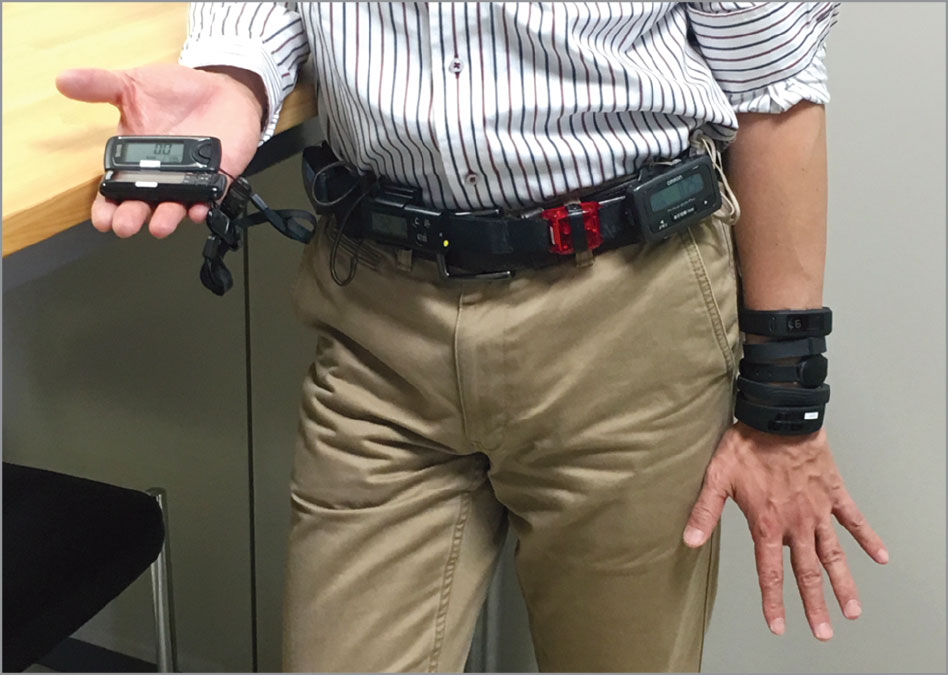Why You Probably Can't Trust Fitness Tracker Calorie Estimates

If you think your fitness tracker isn't telling you the truth about how many calories you've burned, you're probably right — a new study finds that the devices can vary widely in their calorie estimates and tend to underestimate the number of calories burned.
The findings "suggest that most wearable devices do not produce a valid measure of total energy expenditure," the researchers wrote in their article.
In the study, conducted in Japan, researchers had each of the 19 healthy people wear a whopping 12 fitness trackers (all at the same time) at various places on their waist, chest and wrist. The researchers tested some popular consumer wearables — including the Withings Pulse O2, Jawbone Up24, Garmin Vivofit, Fitbit Flex, Misfit Shine and Epson Pulsense — as well as several wearables used in labs for research purposes.
The researchers compared the calorie measurements from each of the 12 devices with two "gold standard" methods of determining calories burned. [The Best Fitness Trackers for Quantifying Yourself]
In one method, participants spent 24 hours in a "metabolic chamber," which is a sealed room that lets researchers precisely measure the amount of oxygen and carbon dioxide that people breathe in and out. While in the chamber, participants engaged in normal activities, such as eating three meals daily, working at a desk, watching TV and walking on a treadmill.
In the second method, participants were allowed to go about their daily lives at home and at work, but they first drank a special type of "labeled" water that contains an element that's traceable in urine, and allows researchers to calculate how many calories people burn. Participants gave urine samples over a 15-day period while also wearing the fitness trackers at most times, except for when they were bathing or charging the battery.
They found that the fitness tracker estimates of the number of calories people burned ranged from an average of 1,814 calories per day for the Withings Pulse O2 to 2,297 calories per day for the Omron CaloriScan (an activity tracker used in research).
Get the world’s most fascinating discoveries delivered straight to your inbox.
But when compared to the calories measured in the metabolic chamber, some of the fitness trackers underestimated the number of calories burned by as many as 270 calories, and others overestimated them by as many as 200 calories, the study found.
And when compared to the calorie measurements from the labeled-water experiment, all of the fitness trackers underestimated the number of calories burned, with estimates ranging from 69 fewer calories to 590 fewer calories than those measured in the water experiment.
The calorie numbers put out by the fitness trackers "differed widely among devices, and varied significantly from the gold-standard measures," the researchers, from the National Institute of Health and Nutrition in Tokyo, wrote in their findings, published today (March 21) in the journal JAMA Internal Medicine.
"Furthermore, all wearable devices underestimated total energy expenditure under free-living conditions," they said.
The variation in calorie estimates among the different devices may be due to differences in how often the devices record data, and how well they detect postures like sitting and standing, the researchers said. In addition, the devices might underestimate calories because people can't wear them all the time, they said.
The researchers noted that their study was small and included only healthy people, so more studies are needed to confirm the findings.
Follow Rachael Rettner @RachaelRettner. FollowLive Science @livescience, Facebook & Google+. Original article on Live Science.

Rachael is a Live Science contributor, and was a former channel editor and senior writer for Live Science between 2010 and 2022. She has a master's degree in journalism from New York University's Science, Health and Environmental Reporting Program. She also holds a B.S. in molecular biology and an M.S. in biology from the University of California, San Diego. Her work has appeared in Scienceline, The Washington Post and Scientific American.


